高中英语-语法精讲(Unit-18-Inventions)大纲人教版第二册
高二英语Unit 18—Inventions(II)人教版知识精讲
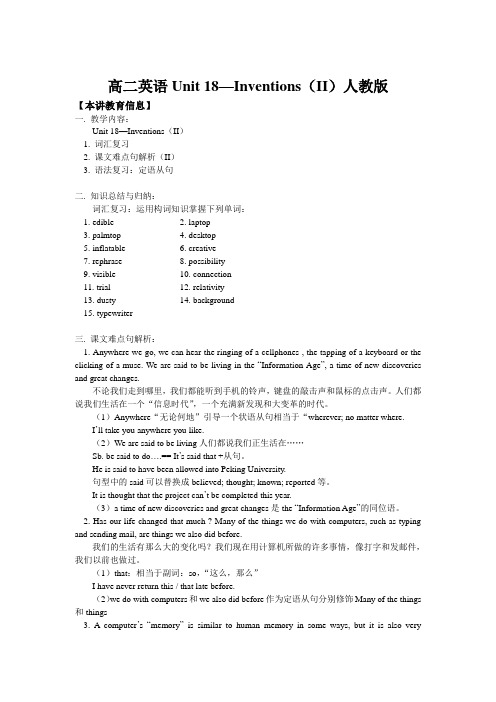
高二英语Unit 18—Inventions(II)人教版【本讲教育信息】一. 教学内容:Unit 18—Inventions(II)1. 词汇复习2. 课文难点句解析(II)3. 语法复习:定语从句二. 知识总结与归纳:词汇复习:运用构词知识掌握下列单词:1. edible2. laptop3. palmtop4. desktop5. inflatable6. creative7. rephrase 8. possibility9. visible 10. connection11. trial 12. relativity13. dusty 14. background15. typewriter三. 课文难点句解析:1. Anywhere we go, we can hear the ringing of a cellphones , the tapping of a keyboard or the clicking of a muse. We are said to be living in the “Information Age”, a time of new discoveries and great changes.不论我们走到哪里,我们都能听到手机的铃声,键盘的敲击声和鼠标的点击声。
人们都说我们生活在一个“信息时代”,一个充满新发现和大变革的时代。
(1)Anywhere“无论何地”引导一个状语从句相当于“wherever; no matter where.I’ll take you anywhere you like.(2)We are said to be living人们都说我们正生活在……Sb. be said to do….== It’s said that +从句。
He is said to have been allowed into Peking University.句型中的said可以替换成believed; thought; known; reported等。
高中英语(人教大纲)第二册下:Unit18 Inventions(第二课时)
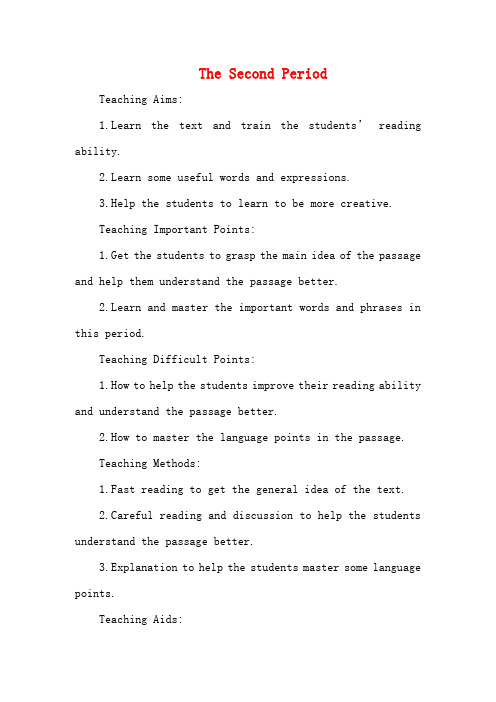
The Second PeriodTeaching Aims:1.Learn the text and train the students’reading ability.2.Learn some useful words and expressions.3.Help the students to learn to be more creative.Teaching Important Points:1.Get the students to grasp the main idea of the passage and help them understand the passage better.2.Learn and master the important words and phrases in this period.Teaching Difficult Points:1.How to help the students improve their reading ability and understand the passage better.2.How to master the language points in the passage.Teaching Methods:1.Fast reading to get the general idea of the text.2.Careful reading and discussion to help the students understand the passage better.3.Explanation to help the students master some language points.Teaching Aids:1.the multimedia2.the blackboardTeaching Procedures:Step Ⅰ GreetingsGreet the whole class as usual.Step Ⅱ Lead-in and Pre-readingT:In the last period,we talked about some new inventions.We know that inventions can make people’s life easier and better.They will do a lot of good to people.But how do people come up with ideas for new inventions?Do you have to be very intelligent to be an inventor?Are some people born creative,or is it possible to learn how to be creative?If you want to be an inventor yourself,you must have a lot of questions.Now,read the passage quickly to find the answers to these questions on Page 59.Step Ⅲ Reading and Understanding(Allow the students a few minutes to find he answers to the questions.)T:Have you finished?Ss:Yes.T:Good.Now,have a discussion with your partner.If you don’t agree with each other,read the passage again to checkyour answers.A moment later,I’ll ask some of you to tell us your answers.(A moment later.)T:Well.Now,Xiao Hui,tell your answer to the first question,please.S:I think some people are born creative.T:Do you agree with her,Li Ling?S:I’m afraid not.I think it is possible to learn how to be creative.T:Can you tell us why?S:Because creative thinking is a matter of habits.By thinking about how we think and practising good thinking strategies,we can become more creative.T:Good.Please sit down.Now,who’d like to answer the second question?S:I’d like to have a try.I don’t think people have to be very intelligent to be an inventor.Because only some of the thinkers did well in school.And creativity is not about getting high test scores,having a high IQ or being smart.T:Does anybody have a different opinion?Or do you agree with her?Ss:We agree with her.T:OK.Now,the last question.Who knows the answer?S:I want to have a try.I think people should try new ways to solve a problem,and break away from old thought patterns.T:Good.Who has anything else to say?S:I think people should look at a problem in as many ways as possible.T:Anything else?S:People should try to combine new with old ideas in as many different ways as possible.By comparing and connecting ideas and objects in new ways,people may think of new applications and solutions.S:I have something else to say.Good ideas are no accident.They are the result of a long process of trial and error.T:Well done!You’ve all got the main idea of the passage.Now,please read the passage carefully again to check some detailed information.Look at the sentences on the screen and tick the sentences that are true according to the text and correct the false ones.(The multimedia shows the following sentences.)(A moment later,ask some students to say their answers and check them with the whole class.)Suggested answers:1.(×)Most inventors don’t necessarily have high IQs.2.(√)3.(×)It’s possible to learn how to be creative.4.(×)The best way to find a good solution is not to look for one good answer only.Partial solutions and even failures give us more information and clues that help us move towardsa better solution.5.(×)Inventors all know that for each new invention thatworks,there are at least ten that don ’t.6.(√)7.(√)Step Ⅳ ExplanationT:Good job.In order to help you understand the passage better,I ’ll explain some useful words and expressions to you.Look at the screen and listen carefully.(The following is shown on the screen.) Language Points:1.be born+adj./n.e.g.He was born ⎩⎨⎧singer.a blind. e up withe.g.Scientists will come up with new ways of increasing the world ’s food supply.3.allow fore.g.We must allow for the bus being late —it always is.4.get stucke.g.The car got stuck in the mud.5.break away frome.g.The prisoner broke away from his guards.A province has broken away to form a new state.6.be aware of/thate.g.Are you aware of the time?She became aware that something was burning.(Explain the language points and write the phrases on the blackboard:be born+adj./n.,come up with,allow for,get stuck,break away from,be aware of/that…)Step Ⅴ DiscussionT:Look at the examples on the screen.They have been mixed up.Read the passage carefully again and place them in the right paragraph.You may have a short discussion with your partner.(Show the following on the screen and allow the students to read the passage again and discuss in pairs.)1.According to Leonardo da Vinci,problems which had seemed impossible could be solved if he changed the way he described the problem.2.Thomas Edison made a rule saying that he had to make an invention every ten days.3.Mozart,who lived in Austria,wrote more than 600 pieces of music.4.Einstein,who changed the world of physics forever with his Theory of Relativity,preferred images to numbers.5.Samuel Morse,the man who invented the telegraph,gothis idea by watching a rider exchange a tired horse for a new one.(A moment later,ask some students to say their answers.If they have different opinions,allow them a few minutes to have another discussion.)Suggested answers:1.→Think outside the box2.→Keep trying3.→Keep trying4.→Take another look at it5.→Make connectionsStep Ⅵ Listening and ReadingT:Good.You’ve understood the passage well.Now,let’s listen to the tape.The first time I play it for you,you should listen carefully and the second time,you can read after it.Pay attention to your pronunciation and intonation.(Play the tape twice for students to listen and repeat.And then if time permits,ask some students to read the passage.One student,one paragraph.Help students with their pronunciation.)Step Ⅶ Summary and HomeworkT:Today,we’ve read a passage about how to be morecreative.And also we’ve learnt some useful phrases.After class,you should read the text again and again to understand it better.Try to use the new phrases more to master them better.Remember to preview the next two parts:Language study and Grammar.So much for today.Class is over.See you tomorrow!Ss:See you tomorrow!Step Ⅷ The Design of the Writing on the BlackboardUnit 18 InventionsThe Second Period1.be born+adj./n.e up with3.allow for4.get stuck5.break away from6.be aware of/that…Step Ⅸ Record after Teaching。
高中英语人教大纲版第二册下词汇讲解(Unit 18 Inventions)

高中英语人教大纲版第二册下词汇讲解(Unit 18
Inventions)
Unit 18Inventions
Warming up,Listening and Speaking
词汇讲解
三点剖析
...be prepared to explain why.
......准备好说明原因。
be prepared...准备好......
【典型例句】
Children are prepared to begin their school life.
孩子们已经准备好开始上学了。
The army is well prepared for the worst.
军队作好了应付最坏情况的准备。
The foreign minister was not prepared for answering such a tough question.
外交部长对回答这样一个刁钻的问题没有思想准备。
【要点归纳】
be prepared to do/for(doing)sth.意思是”(从思想和物质上)为某事作好了
准备”,表示状态。
【相关链接】
(1)prepare sth.”准备某事”,含义相当于get sth.ready,强调准备的动作
与过程,所需时间往往较短。
例如:
It’s very late,but the assistant teacher hasn’t prepared his lessons yet.。
高中英语Unit 18 Inventions 4人教版第二册(下)
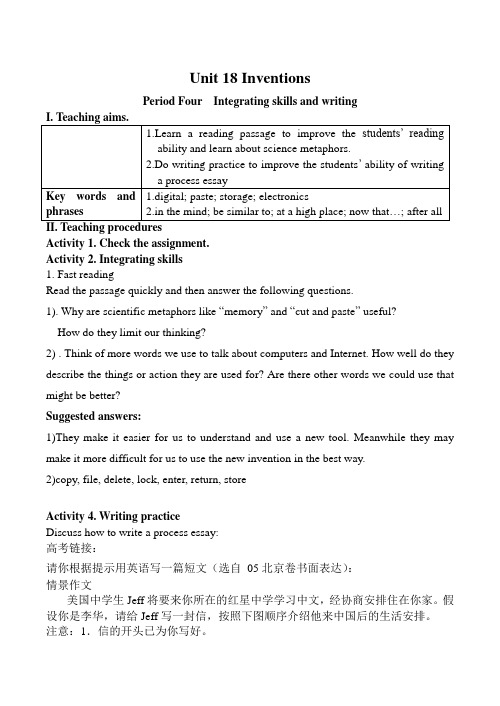
Unit 18 InventionsPeriod Four Integrating skills and writingActivity 1. Check the assignment.Activity 2. Integrating skills1. Fast readingRead the passage quickly and then answer the following questions.1). Why are scientific metaphors like “memory” and “cut and paste” useful?How do they limit our thinking?2) . Think of more words we use to talk about computers and Internet. How well do they describe the things or action they are used for? Are there other words we could use that might be better?Suggested answers:1)They make it easier for us to understand and use a new tool. Meanwhile they may make it more difficult for us to use the new invention in the best way.2)copy, file, delete, lock, enter, return, storeActivity 4. Writing practiceDiscuss how to write a process essay:高考链接:请你根据提示用英语写一篇短文(选自05北京卷书面表达):情景作文美国中学生Jeff将要来你所在的红星中学学习中文,经协商安排住在你家。
高中英语人教大纲版第二册下语法精讲(Unit 18 Inventions)
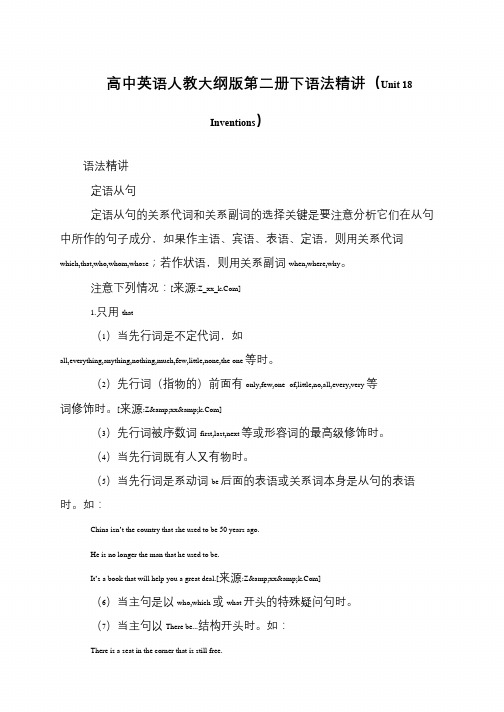
高中英语人教大纲版第二册下语法精讲(Unit 18Inventions)语法精讲定语从句定语从句的关系代词和关系副词的选择关键是要注意分析它们在从句中所作的句子成分,如果作主语、宾语、表语、定语,则用关系代词which,that,who,whom,whose;若作状语,则用关系副词when,where,why。
注意下列情况:[来源:Z_xx_]1.只用that(1)当先行词是不定代词,如all,everything,anything,nothing,much,few,little,none,the one 等时。
(2)先行词(指物的)前面有only,few,one of,little,no,all,every,very 等词修饰时。
[来源:Z&xx&](3)先行词被序数词first,last,next 等或形容词的最高级修饰时。
(4)当先行词既有人又有物时。
(5)当先行词是系动词be 后面的表语或关系词本身是从句的表语时。
如:China isn’t the country that she used to be 50 years ago.He is no longer the man that he used to be.It’s a book that will help you a great deal.[来源:Z&xx&] (6)当主句是以who,which 或what 开头的特殊疑问句时。
(7)当主句以There be...结构开头时。
如:There is a seat in the corner that is still free.。
【精品】高中英语(人教大纲)第二册下Unit18 Inventions(第三课时)
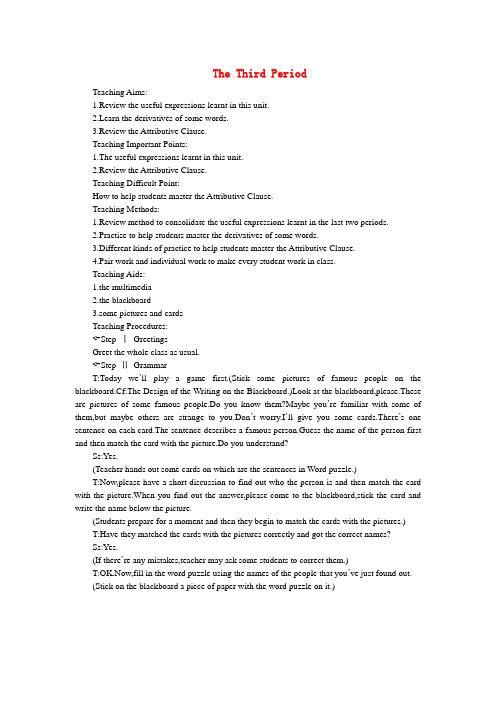
The Third PeriodTeaching Aims:1.Review the useful expressions learnt in this unit.2.Learn the derivatives of some words.3.Review the Attributive Clause.Teaching Important Points:1.The useful expressions learnt in this unit.2.Review the Attributive Clause.Teaching Difficult Point:How to help students master the Attributive Clause.Teaching Methods:1.Review method to consolidate the useful expressions learnt in the last two periods.2.Practise to help students master the derivatives of some words.3.Different kinds of practice to help students master the Attributive Clause.4.Pair work and individual work to make every student work in class.Teaching Aids:1.the multimedia2.the blackboard3.some pictures and cardsTeaching Procedures:Step ⅠGreetingsGreet the whole class as usual.Step ⅡGrammarT:Today we’ll play a game first.(Stick some pictures of famous people on the blackboard.Cf:The Design of the Writing on the Blackboard.)Look at the blackboard,please.These are pictures of some famous people.Do you know them?Maybe you’re familiar with some of them,but maybe others are strange to you.Don’t worry.I’ll give you some cards.There’s one sentence on each card.The sentence describes a famous person.Guess the name of the person first and then match the card with the picture.Do you understand?Ss:Yes.(Teacher hands out some cards on which are the sentences in Word puzzle.)T:Now,please have a short discussion to find out who the person is and then match the card with the picture.When you find out the answer,please come to the blackboard,stick the card and write the name below the picture.(Students prepare for a moment and then they begin to match the cards with the pictures.) T:Have they matched the cards with the pictures correctly and got the correct names?Ss:Yes.(If there’re any mistakes,teacher may ask some students to correct them.)T:OK.Now,fill in the word puzzle using the names of the people that you’ve just found out.(Stick on the blackboard a piece of paper with the word puzzle on it.)1 12 32434567(A moment later,ask several students to write down their answers.Cf:The Design of the Writing on the Blackboard.)T:Do you agree with them?Ss:Yes,they’re quite right.T:Good.These people are all famous people.Look at the sentences on the cards.What do you find?S:I find that there is an Attributive Clause in each sentence,restrictive or non-restrictive.T:Yes,you’re a careful girl.This game is also for you to review the Attributive Clause.Read these sentences again and find out the Attributive Clause in each sentence.(A moment later,ask some students to say their answers.)Suggested answers:Across:1.…,whose name is always linked with his cartoon characters,such as Mickey Mouse and Donald Duck.2.…,who was born in Germany but spent his last years in the USA.3.…,among whose big inventions are electric lighting and the motion picture camera.4.…,whose many great films were City Lights and Modern Times.5.…,who died in a plane crash in 1997.6.…,whose famous songs include Blowing In The Wind.7.…,who discovered the Law of Gravity.Down:1.…,who lived in China before the Liberation.2.…,who fought for the freedom of slaves in the USA.3.…,who was Adam’s wife.4.…,whose ideas about the future have often become reality,…5.…,who later bravely fought against the British invasion and saved her country and people.T:We’ve learnt a lot about the Attributive Clause before.We know that it is a very important grammar item,so let’s do some more exercises to consolidate it.Turn to Page 61,and finish Exercise 2 in Grammar part.(Allow the students a few minutes to finish it and then check the answers.)Suggested answers:1.The wires with which the machines were connected were very old.2.Leonardo da Vinci,who was interested in both literature and science,painted the famous “Smiling Mona Lisa”.3.The pilot with whom we had dinner told us stories about his travels.4.The four ancient Chinese inventions,which we are proud of,have remained important inhuman history for thousands of years.5.Mozart,whose music is well liked by people all over the world,showed his talent in music ata very young age.6.The photos are kept in that cupboard in which/where we found our parents’ old photos.7.The country from which this news report is coming is on the other side of the world.8.One of the first inventions of human beings was the wheel,which we don’t know who first invented.T:In this unit,we have learnt a lot about new inventions and famous inventors.Now,let’s do an exercise using what we’ve learnt in this unit to review the Attributive Clause.Turn to Page 61 and finish Exercise 1 in Grammar part,please.Finish them first by yourselves and then you may discuss your answers in pairs.(A few minutes later,ask some students to read out their answers.Students may have various answers.)Suggested answers:1.…can be used at home or in an office.2.…it is not convenient to use a desktop computer.3.…businesses are busy.4.…you can obtain a patent for your invention.5.…we need something more useful or more convenient to satisfy the needs of people.6.…invents things.7.…are both delicious and environmentally friendly./can be eaten.Step ⅢWord StudyT:As you know,there are a lot of useful expressions in this unit.Let’s do some exercises to review them.(Show the following on the multimedia and allow the students a couple of minutes to finishclass.Give some explanations when necessary.)Suggested answers:1.of(be tired of doing sth.)2.from(break away from…)3.into(break into tears/a house)4.for(allow for…)5.for(exchange A for B)6.by(get stuck by…)T:Well done!After class you should read these sentences more to master the use of the phrases in them.Now,let’s do another practice.Suggested answers:trial→try(v.)application→apply(v.)produce→productive(adj.)fail→failure(n.)involvement→involve(v.)eraser→erase(v.)inspiration→inspire(v.)possible→possibility(n.)deep→deepen(v.)awareness→aware(adj.)Step ⅣSummary and HomeworkT:Today we’ve reviewed some useful expressions and words we learnt before.Also we’ve done some practice to review the Attributive Clause.After class,you should do more practice to master them better.Besides,try to solve the riddles in Part 14 on Page 62.That’s all for today.See you tomorrow!Ss:See you tomorrow!Walt Disney Albert EinsteinAbraham Lincoln NewtonJohn Denver Charlie ChaplinWord puzzle:W A L TStep ⅥRecord after Teaching。
【精品】高中英语(人教大纲)第二册下Unit18 Inventions(第一课时)
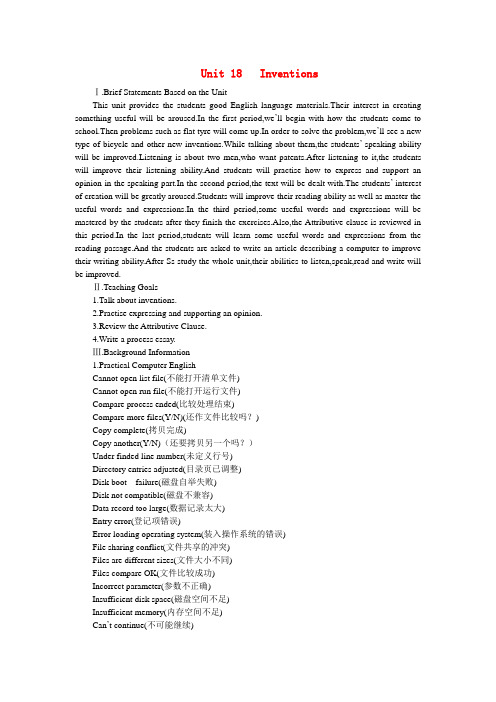
Unit 18 InventionsⅠ.Brief Statements Based on the UnitThis unit provides the students good English language materials.Their interest in creating something useful will be aroused.In the first period,we’ll begin with how the students come to school.Then problems such as flat tyre will come up.In order to solve the problem,we’ll see a new type of bicycle and other new inventions.While talking about them,the students’ speaking ability will be improved.Listening is about two men,who want patents.After listening to it,the students will improve their listening ability.And students will practise how to express and support an opinion in the speaking part.In the second period,the text will be dealt with.The students’ interest of creation will be greatly aroused.Students will improve their reading ability as well as master the useful words and expressions.In the third period,some useful words and expressions will be mastered by the students after they finish the exercises.Also,the Attributive clause is reviewed in this period.In the last period,students will learn some useful words and expressions from the reading passage.And the students are asked to write an article describing a computer to improve their writing ability.After Ss study the whole unit,their abilities to listen,speak,read and write will be improved.Ⅱ.Teaching Goals1.Talk about inventions.2.Practise expressing and supporting an opinion.3.Review the Attributive Clause.4.Write a process essay.Ⅲ.Background Information1.Practical Computer EnglishCannot open list file(不能打开清单文件)Cannot open run file(不能打开运行文件)Compare process ended(比较处理结束)Compare more files(Y/N)(还作文件比较吗?)Copy complete(拷贝完成)Copy another(Y/N)(还要拷贝另一个吗?)Under finded line number(未定义行号)Directory entries adjusted(目录页已调整)Disk boot failure(磁盘自举失败)Disk not compatible(磁盘不兼容)Data record too large(数据记录太大)Entry error(登记项错误)Error loading operating system(装入操作系统的错误)File sharing conflict(文件共享的冲突)Files are different sizes(文件大小不同)Files compare OK(文件比较成功)Incorrect parameter(参数不正确)Insufficient disk space(磁盘空间不足)Insufficient memory(内存空间不足)Can’t continue(不可能继续)Device fault(设备故障)Device I/O error(I/O设备错)Device timeout(设备超时)Disk full(磁盘满)Disk write protect(磁盘写保护)Disk not ready(磁盘没准备好)Division by zero(除数为零)Duplicate definition(重复定义)File already exists(文件已经存在)File already open(文件已打开)File not found(文件没找到)FOR without NEXT(For语句中没有对应的next语句)Illegal direct(非法的直接使用)Illegal function call(非法函数调用)Incorrect DOS version(不正确的DOS版本)Internal error(内部错误)out of data(数据不够)out of memory(超内存)out of paper(打印纸不够)overflow(溢出)Path not found(路径没找到)String too long(字符串过长)Subscript out of range(下标范围不够)Syntax error(句法错误)Too many files(文件过多)Type mismatch(类型不匹配)Access denied(存取被拒绝)Backup file sequence error(后备文件顺序错误)Bad or missing command interpreter(非法的或缺少命令解释程序)Bad partition table(非法的区分表)Bad unit(非法的装置)Batch file missing(批处理文件丢失)Cannot execute FORMAT(不能执行FORMAT)Cannot find system files(找不到系统文件)Cannot open overlay(不能打开覆盖段) of the FutureWhere is television going from here?Television,the box itself and what it does,is changing greatly.While nobody is really sure what it’s going to look like,TV and the Internet are coming silently together.In the old days of broadcasting,people used to say that the real miracle(奇迹)of television was turning air into money.The television miracle of the future is interactive(相互影响的).“The Internet is the most significant change in creating what becomes the next mass media that I think any of us will experience in our lifetime,”says Tom Frank,a network ing unused lines in the TV spectrum(范围),broadcasters are learning how to put brand-newinteractivity into TV programs.There will be a little instrument that will indicate that interactivity is present and possible.Then,just will a standard remote control like this you would be able to press one button and say,start that interactivity.A menu would appear,similar to the one on a web site,that would let you interact with the program as it was being broadcast.If you are watching a cooking show,for example,you can print the recipe(烹饪法)or even pause the show and buy the ingredients.Many web sites do exist now where you can actually get your food shopping done for yourself and delivered to your house.So you can order the very ingredients for the dish you are watching the chef make on TV.And it will bring the right quantity of things directly to your house.You could also interact with TV commercials.While you’re watching a commercial,you have the choice to buy the clothes the actors are wearing.Of course,the more you interact with this new sort of TV,the more you leave a digital record,and the more advertisers learn about your shopping habits.In fact,TV ads might be targeted at this special group of people who share a common interest.In the future,almost anything might be possible.Even news programs like World News Tonight could be improved.You could have the choice of changing camera angles.If you wanted,you could pause what a reporter is saying and go back to World News Tonight to watch the next story,or skip to the last story in the show,or perhaps go deeper into a topic and view an interview prepared for Nightline later on.In the near future,you’re expected to see television develop to become more like the Internet,meaning more choice,the ability to do the sorts of things you want to do at the moment you wish to do them.Ⅳ.Teaching Time:Five periodsThe First PeriodTeaching Aims:1.Improve the students’ listening ability.2.Talk about some topics about inventions and practise supporting an opinion.3.Learn and master some useful words and expressions.Teaching Important Point:Train the students’listening and speaking abilities by talking about and listening to some materials.Teaching Difficult Points:1.How to help students to improve their listening ability.2.How to help the students to learn to express and support an opinion.Teaching Methods:1.Discussion to make students talk about inventions.2.Individual or pair work to make students practise their speaking ability.3.Listening practice to improve the students’ listening ability.Teaching Aids:1.the multimedia2.the blackboard3.some cardsTeaching Procedures:Step ⅠGreetingsGreet the whole class as usual.Step ⅡWarming-up and DiscussionT:(Walk to one student.)How do you come to school every day,Wang Jing?S:I come to school on foot every day.My home is quite near.It only takes me about ten minutes.T:That’s quite convenient.You’re lucky.And,Li Fang,how about you?S:I come to school by bike.It takes me about 15 minutes to get to our school.T:You must be careful on your way to and from school.There must be many people on the road.Do you think it convenient?S:Most of the time it is,but sometimes my bike has a flat tyre.I have to get it repaired and therefore I’ll be late for school.Once I even lost my bike.When I went to get it,it was gone.I had to take a taxi to go home and buy another bike.T:I’m sorry to hear that.But suppose a new type of bike has been invented,what do you want it to be like?S:I think the new type of bike can be folded up and carried about so that it will not be stolen.T:Good idea.But this is not very convenient.It’s not easy for you to carry a bike around,is it?S:No,it isn’t.What should it look like then?Please tell us.T:OK.Let’s watch the short video.(Play the video for explaining how an inflatable bicycle works.)T:That’s the new type of bike.It’s a kind of inflatable bicycle.Who can tell us the advantages of it?S:Let me have a try.We’ll not have to worry about having our bikes stolen again.Because we can let the air out and put the bike in bag.It’s very convenient to be carried around since it is not heavy.T:Very good.I think I’ll buy one when it is on sale.We know that inventions can make our life easier and better.Today we’ll talk about some inventions.(Stick the pictures of electric shoes,inflatable bicycle,edible chopsticks and nose-top②④T:Look at these pictures,please.Do you know what they are?Li Jie,will you have a try?S:I think the second invention is the inflatable bike that we’ve just talked about.In the third picture,the man is eating the chopsticks after his meal.I guess these chopsticks are edible ones.I’m not sure about the others.T:Good.You’re right.The second one is the inflatable bicycle.(Bb:inflatable bicycle)and the third are edible chopsticks.(Bb:edible chopsticks)They’re delicious and environmentally friendly.We can save some trees and have a snack at the same time.They come in five different flavours. You will never need to wash chopsticks again.Isn’t this wonderful?S:Yes,it’s great.But,Miss Guo,maybe we could invent edible plates,bowls,cups and so on.T:Oh,you’re great!I’m sure you have got a wonderful idea.Maybe one day you can invent such things.Study hard and you’ll be an inventor in the future.Now,let’s look at the first picture.Who knows what it is?S:I think it is a special kind of shoe which can make electricity.If we wear such shoes,we can see the road in dark places.We needn’t take a flashlight with us any more.S:I don’t quite agree with you.Maybe this shoe can make you feel warm using the electricity it makes.T:You both are very clever.This is called the electric shoe.(Bb:electric shoe)The heel of this shoe is a machine that makes electricity with every step you take.You will never need batteries again.But maybe you have better ideas about how to make use of the electricity it makes.If you like,you could have a try to make your own invention in your spare time.Now,let’s look at the fourth picture.Does anybody have an idea?S:It looks like a computer which is fixed onto the man’s nose.And the keyboard is on his vest.I can’t believe it.T:Yes,you’re quite right.This is called the nose-top computer.(Bb:nose-top computer)This new nose-top computer weighs less than a pair of glasses.It fits comfortably on your nose.When you want to type something you can use the keyboard vest.You will never have to carry a heavy laptop computer.These inventions are all wonderful.But which of them do you think would be useful?Please have a discussion in groups of four and tell us why you think so.(Ss have their discussions in groups of four for about five minutes.Teacher may ask one group to act out their discussion or report their results.)Sample dialogue:A:I think the inflatable bicycle would be useful.Because it’s convenient to carry and we needn’t worry about having our bikes stolen.B:That’s quite true,but I think the edible chopsticks are useful.Because it not only saves trees but also saves water.It is very important to save our natural resources and protect our earth.C:You’re quite right,but I have a different opinion.I think the nose-top computer is useful.Because the computer is used more and more widely.It’s convenient to carry such a computer around when doing business.…Step ⅢPreparation for ListeningT:We know that when someone has invented something,usually he will go to a patent officer to apply for a patent.Now,let’s listen to two dialogues.In these two dialogues,Mr Dean and Mr Scoles both have invented something.They’re trying to get the patent for their inventions from the patent officer.Before we listen to the tape,go through the questions on Page 15 by yourselves,and see what we should do after listening.Step ⅣListeningT:(A few minutes later.)Are you ready?Ss:Yes.T:OK.Listen carefully and answer the questions first on your own and then check your answers with your partner.(Play the tape twice for students to listen to and then answer the questions.Play it a third time for students to check their answers.Allow the students a few minutes to check their answers in pairs.At last,check the answers with the whole class.)Step ⅤSpeakingT:Well done.Now,you’ve known how to apply for a patent.Let’s play a game.Each of you will be given a role card.Work in groups of five:four inventors and one patent officer.Each inventor should explain how the invention works and why it is useful.The patent officers should ask questions and decide if each invention is a good idea or not.And I’ll show you some useful expressions to help you.teacher may ask some groups to act out their discussion.)Sample dialogue:(A—Inventor A;B—Inventor B;C—Inventor C;D—Inventor D;P—Patent officer)P:Now,please explain how your inventions work and why they are useful.Your invention is a car that uses water instead of petrol,isn’t it?A:Yes,that’s right.P:What does it look like?A:It looks like an ordinary car.Here’s the picture.Please have a look.P:Oh,it looks beautiful.What’s it made of?A:It’s made of a new kind of alloy,which is much lighter.P:Does it cost more?A:A little bit.But it can save much more energy,so lots of money is saved.Besides,there is something even more important.It is good for our environment.It doesn’t pollute the air.P:Sounds great.Thank you.And what’s your invention,sir?B:My invention is a flying bicycle.P:A flying bicycle?How would people use it?B:People can ride it on the road and when there are too many bicycles,people can fly it.Just push one button on the handle,the bicycle will fly.P:How does it work?B:It works like a small plane.It has a special engine.P:This is a new way to improve our traffic condition.Thank you.(To C)Would you please explain your new invention to me?C:My invention is a machine that makes it possible for people to know the future.P:How would people use it?C:People just input their date of birth,hobbies,dislikes and anything about themselves,andthen press the button,wait for a moment,and they will see the result on the screen.P:That’s interesting.Thank you.(To D)What’s your invention,please?D:It’s a pen that can automatically translate what you write into a foreign language.P:Good.It can help people communicate freely with foreign friends.People needn’t study foreign languages hard any more.But,maybe it will make it more difficult for people to communicate orally.They will have to write down what they want to say.This is not convenient. For the flying bicycle,what if there was something wrong with it when it was flying in the air?I think it would be rather dangerous for the people walking on the ground.Maybe the bike would fall onto them and cause an accident.Of course the rider would be in danger,too.For the machine that makes people know the future,I don’t think it’s a good idea for us to know our future too early.I think the most useful invention is the car that uses water instead of petrol.So I will give the inventor of this new car a patent.A:Thank you,sir.Step ⅥSummary and HomeworkT:Today we’ve learnt how to express and support an opinion.And we’ve learnt how to apply for a patent when you have made an invention.Many of you have wonderful ideas about new inventions.Study hard now and I believe you’ll make your own inventions in the future.In the next period,we’ll read about how to be creative and how to be an inventor.It’ll be very useful for you.Preview the reading part carefully after class,please.OK.That’s all for today.See you tomorrow!Ss:See you tomorrow!②inflatable bicycle④nose-top computerStep ⅧRecord after Teaching。
高中英语Unit 18 Inventions 3人教版第二册(下)
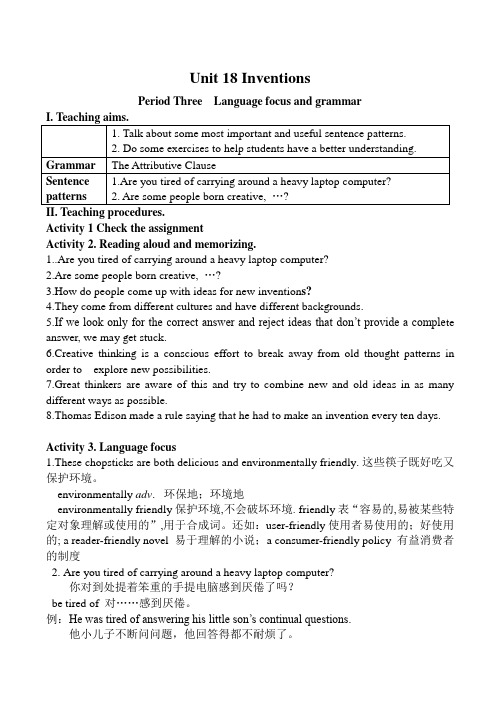
Unit 18 InventionsPeriod Three Language focus and grammarActivity 1 Check the assignmentActivity 2. Reading aloud and memorizing.1..Are you tired of carrying around a heavy laptop computer?2.Are some people born creative, …?3.How do people come up with ideas for new invention s?4.They come from different cultures and have different backgrounds.5.If we look only for the correct answer and reject ideas that don’t provide a comple te answer, we may get stuck.6.Creative thinking is a conscious effort to break away from old thought patterns in order to explore new possibilities.7.Great thinkers are aware of this and try to combine new and old ideas in as many different ways as possible.8.Thomas Edison made a rule saying that he had to make an invention every ten days.Activity 3. Language focus1.These chopsticks are both delicious and environmentally friendly.这些筷子既好吃又保护环境。
- 1、下载文档前请自行甄别文档内容的完整性,平台不提供额外的编辑、内容补充、找答案等附加服务。
- 2、"仅部分预览"的文档,不可在线预览部分如存在完整性等问题,可反馈申请退款(可完整预览的文档不适用该条件!)。
- 3、如文档侵犯您的权益,请联系客服反馈,我们会尽快为您处理(人工客服工作时间:9:00-18:30)。
语法精讲定语从句定语从句的关系代词和关系副词的选择关键是要注意分析它们在从句中所作的句子成分,如果作主语、宾语、表语、定语,则用关系代词which,that,who,whom,whose;若作状语,则用关系副词when,where,why。
注意下列情况:1.只用that(1)当先行词是不定代词,如all,everything,anything,n othing,much,few,little,none,the one等时。
(2)先行词(指物的)前面有only,few,one of,little,no,all,every,very等词修饰时。
(3)先行词被序数词first,last,next等或形容词的最高级修饰时。
(4)当先行词既有人又有物时。
(5)当先行词是系动词be后面的表语或关系词本身是从句的表语时。
如:China isn’t the country that she used to be 50 years ago.He is no longer the man that he used to be.It’s a book that will help you a great d eal.(6)当主句是以who,which或what开头的特殊疑问句时。
(7)当主句以There be…结构开头时。
如:There is a seat in the corner that is still free.There are two tickets of the film that are for you.(8)当先行词是what时,如:What did you hear that made you so angry?(9)当先行词是基数词时。
如:Yesterday I caught two fish and put them in a basin of water.Now you can see the two that are still alive.2.只用which(1)在非限制性定语从句中充当主语或定语时。
(2)当关系代词前有介词时。
(3)当先行词本身that是时。
如:What’s that which flashed in the sky just now?3.只用who 不用that(1)先行词是one,ones或anyone时。
(2)先行词为those或被those修饰,指人时。
如:Those who learn not only from books but also through practice will succeed.(3)在there be… 的句子中,先行词为人时。
如:There is a comrade outside who w ants to see you.(4)当定语从句中又有定语从句,且先行项都为人时。
如:The student that won the first prize is the monitor who works hard.(5)当指人的先行项被一些指物的名词修饰时。
如:There’s only one student in the school who I want to see.Do you know the woman in blue with a baby on her back who is working in the fields?(6)在非限制性定语从句中指人。
如:I met a friend of mine in the street,who had just come from America.(7)定语从句中有插入语时,并不影响关系代词和副词的选择。
如:Jackson is a man who I believe is honest.He won another award,which I think is the result of his hard work.4.在定语从句中,whose作定语,其先行词既可以是人,又可以是物。
如:Lei Feng was a great communist fighter whose death was weightier than Mount Tai.Where’s the window whose glass is broken?5.as,which的比较(1)在非限制性定语从句中,均可替代整个主句或句中某个部分,在从句中作主语、宾语、表语。
如从句在主句之后,两者皆可用。
如:Grammar is not a set of dead rules,which/as I have said before.(2)如从句在主句之前,用as。
(3)如关系代词代表主句全句意思,有“正如……,就像……”之意时,用as。
如:We won the match,as we had expected.(4)当先行词被the same,such,so修饰时,用as。
如:This is the same books as you bought yesterday.(同类书)比较:This is the same book that you bought yesterday.(同一本书)考题再现【考例1】(2006江西高考,33)—Do you have anything to say for yourselves?—Yes,there’s one point ______we must insist on.A.whyB.whereC.howD./解析:此题考查定语从句引导词的选用。
the point 作介词on的宾语,因此应选用关系代词或者省略。
答案:D【考例2】(2006湖南联考) It was in the very house______was built with stones _____he spent his childhood.A.that;thatB.that;whereC.which;whereD.where;that解析:第一个空应引导定语从句,引导词在从句中作主语,且先行词由the very 修饰,故应选择that;第二空引导强调句。
答案:A【考例3】—Have you read the books?—Yes,I have read all the books______you gave me,because they are the best ones _____I have ever read.A.which;thatB.that;thatC.what;whichD.who;what解析:选项在定语从句中都作宾语,且第一个受all的修饰,第二个受形容词最高级修饰,故都使用that。
答案:B【考例4】(2006浙江高考,13)I was given three books on cooking,the first _____I really enjoyed.A.of thatB.of whichC.thatD.which解析:因the first 与three books之间是部分与整体的关系,因此应用介词of,且介词后只能用which,不用that。
答案:B【考例5】(2006全国高考Ⅰ,24) I have many friends, _____some are businessmen.A.of themB.from whichC.who ofD.of whom解析:of whom引导定语从句,of是介词提前,表示“其中的”。
先行词friends是表示人的名词,要用whom。
答案:D]【考例6】(2006天津高考,13) Last month,part of Southeast Asia was struck by floods,from_____ effects the people are still suffering.A.thatB.whoseC.thoseD.what解析:whose引导定语从句,表示effects与part of Southeast Asia是所属关系。
答案:B【考例7】(2006福建高考,22) Look out!Don’t get too close to the house _____roo f is under repair.A.whoseB.whichC.of whichD.that解析:关系代词whose表示“……的”,是关系代词who,which的所有格,因此既可指人,也可指物。
在从句中,whose作定语修饰名词,被修饰词可以是从句的主语、宾语或介词宾语。
根据句意可判断出roof与the house之间是所属关系。
答案:A【考例8】(2006天津高考,12) The Beatles, ______many of you are old enough to remember,came from Liverpool.A.whatB.thatC.howD.as解析:根据句子结构和意义可知空格处应选用一个非限制性定语从句的引导词;what 不引导定语从句,that不能用于引导非限制性定语从句;该定语从句中的引导词应作remember的宾语,排除how。
答案:D。
